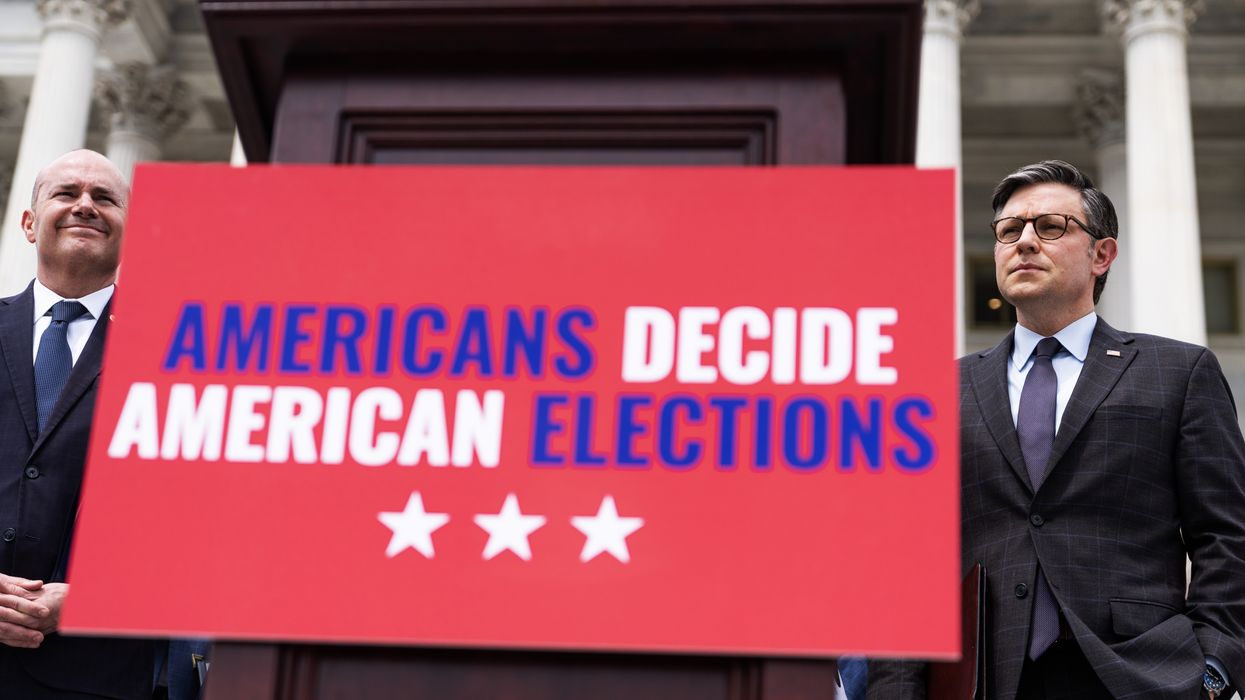Downey is an intern for The Fulcrum and a graduate student at Northwestern's Medill School of Journalism.
WASHINGTON — Members of the House Administration Committee clashed Thursday morning over the true purpose of a hearing called by Republicans to address the perceived threat of noncitizens voting in federal elections.
The title of the hearing, which was led by the Republican majority, was “American Confidence in Elections: Preventing Noncitizen Voting and Other Foreign Interference.” But Democrats saw a far different mission at work.
“Today’s hearing is not actually about noncitizens illegally voting in federal elections,” said Rep. Joseph Morelle (N.Y.), the committee’s top Democrat. “This hearing is about preemptively covering Donald Trump’s lie. The hearing isn’t about laying law and order. It’s about laying the foundation for the next big lie. It’s about saying that illegal voting is the cause of an election defeat.”
Former President Trump and his Republican allies have made noncitizen voting part of a larger conversation surrounding election integrity. With just six months until the election, questions concerning illegal voting and interference, the outcome of the 2020 election and forms of “nontraditional voting” (like mail-in and early voting) have cropped up from the right.
The committee convened to discuss some of these threats one week after Speaker Mike Johnson (R-La.) called on Congress to pass the Safeguard American Voter Eligibility Act, or SAVE Act. Johnson announced the bill last month alongside Trump during a visit to Mar-a-Lago.
If the bill makes it through the committee and is passed by the House, it has virtually no chance of being passed by the Senate.
The SAVE Act would ban noncitizens from voting in federal elections, something already prohibited in all states and at the federal level. It would also require “documentary proof of citizenship,” meaning that those registering to vote must provide a U.S. passport, other photo ID or birth certificate. But some experts, including Michael Waldman, president and CEO of the Brennan Center for Justice, say many eligible citizen voters don’t have those documents.
“Many millions of Americans just don’t have that,” Waldman said Thursday as he testified before the committee. “Most Americans — or at least about half of Americans — do not have a passport.”
A federal voter ID requirement would only be necessary if there was actual proof that noncitizens were widely voting in federal elections, said David Levine, the senior elections integrity fellow for the Alliance for Securing Democracy.
“If we ever got to a point where we had widespread noncitizen voting, perhaps we would be bumping up against this concern about providing proof of citizenship. But we don’t have that problem,” Levine said.
Research from right-of-center think tanks like the Cato Institute and left-leaning organizations like the Brennan Center has concluded that although there have been some cases of noncitizen voting, none had a significant enough impact to influence an election’s outcome.
Although no states have ever allowed noncitizens to vote in federal elections, there are some jurisdictions that do allow noncitizens to vote in local elections. Noncitizens in San Francisco can vote in school board elections. In Maryland and Vermont, noncitizens are eligible to vote in municipal elections and in Washington D.C. noncitizens can vote in all non-federal elections.
Yet, even with few examples of noncitizens illegally voting in federal elections, House Administration Chairman Bryan Steil (R-Wis.) stressed the risk placed on federal election integrity by jurisdictions that allow noncitizens to vote in local elections.
Steil used D.C. as an example of a city threatened by the possibility of noncitizens attempting to vote in a federal race given that the DC Board of Elections mails ballots to all registered voters.
“In Washington, D.C., if there is even a small clerical mistake noncitizens could be mailed a ballot with federal races on them,” Steil said. “The DC Board of Elections held a call a few weeks ago encouraging noncitizens to vote in the municipal elections and told the public it was on the noncitizen to understand that they can’t vote in the federal election.”
According to Levine, though, for most noncitizens who would even consider casting a ballot in a federal election, the risk is not worth the reward.
“If you are purposely or intentionally going to try to do this, you are willing to risk prison and possible deportation for basically providing a paper trail to be caught for one vote which is unlikely to determine the outcome of an election,” Levine said.
Johnson himself said during a press conference on Capitol Hill last week that there is no evidence of noncitizens voting in federal elections while claiming it is a problem nevertheless. “We all know intuitively that a lot of illegals are voting in federal elections, but it’s not been something that is easily provable,” Johnson said.
Even with little evidence, Levine said the issue will continue to be pushed by those Republicans looking to win favor with Trump as he strengthens his “efforts to undermine and cast doubt on American elections.”
Trump’s claims of massive voter fraud in the 2020 election contributed to the Jan. 6, 2021, insurrection at the Capitol. And none of the Republican lawsuits alleging voter fraud or other illegal voting activity were successful.




















Trump & Hegseth gave Mark Kelly a huge 2028 gift